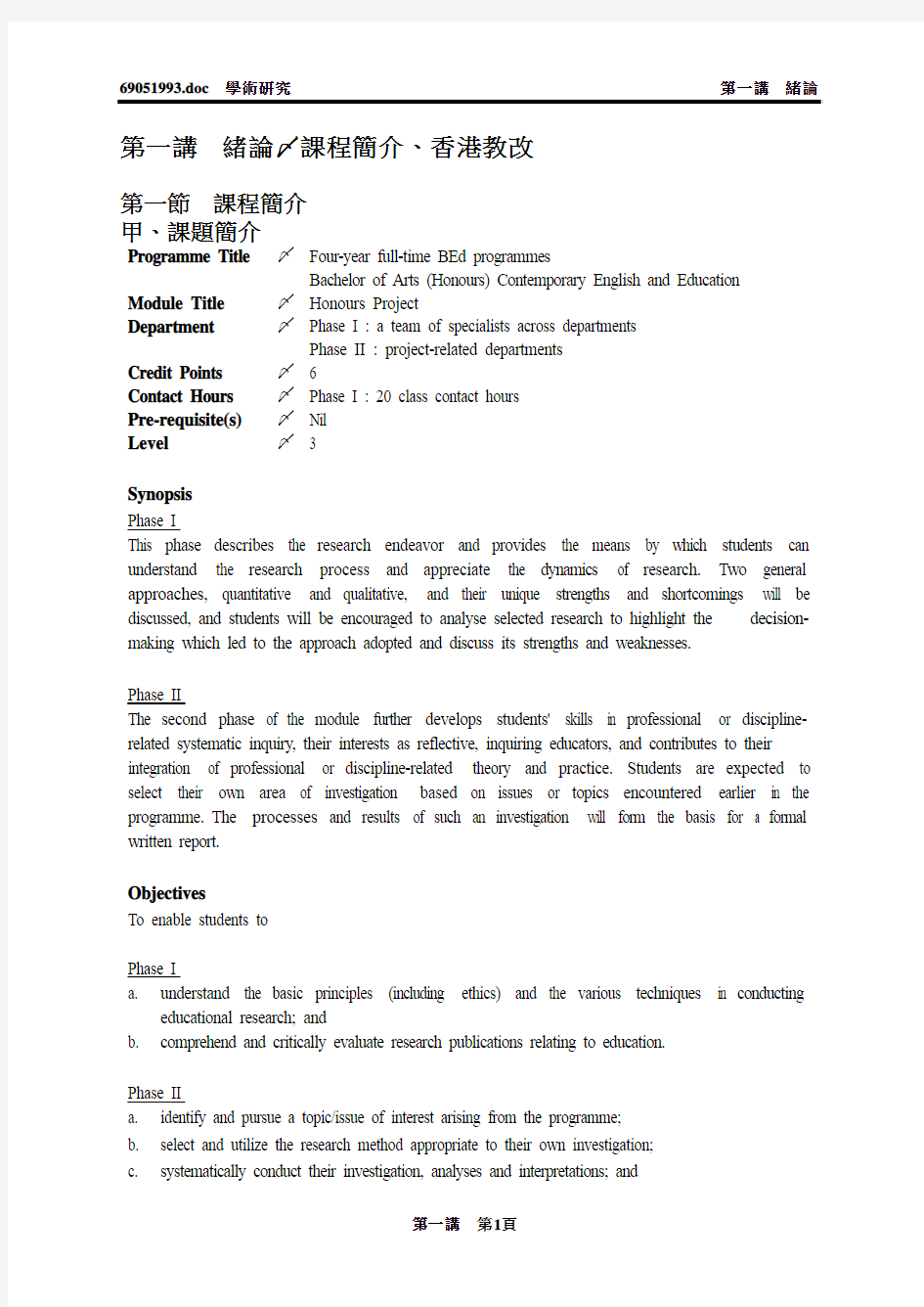AP-1-CL


第一講緒論〆課程簡介、香港教改
第一節課程簡介
甲、課題簡介
Programme Title 〆Four-year full-time BEd programmes
Bachelor of Arts (Honours) Contemporary English and Education Module Title 〆Honours Project
Department 〆Phase I : a team of specialists across departments
Phase II : project-related departments
Credit Points 〆 6
Contact Hours 〆Phase I : 20 class contact hours
Pre-requisite(s) 〆Nil
Level 〆 3
Synopsis
Phase I
This phase describes the research endeavor and provides the means by which students can understand the research process and appreciate the dynamics of research. Two general approaches, quantitative and qualitative, and their unique strengths and shortcomings will be discussed, and students will be encouraged to analyse selected research to highlight the decision-making which led to the approach adopted and discuss its strengths and weaknesses.
Phase II
The second phase of the module further develops students' skills in professional or discipline-related systematic inquiry, their interests as reflective, inquiring educators, and contributes to their integration of professional or discipline-related theory and practice. Students are expected to select their own area of investigation based on issues or topics encountered earlier in the programme. The processes and results of such an investigation will form the basis for a formal written report.
Objectives
To enable students to
Phase I
a. understand the basic principles (including ethics) and the various techniques in conducting
educational research; and
b. comprehend and critically evaluate research publications relating to education.
Phase II
a. identify and pursue a topic/issue of interest arising from the programme;
b. select and utilize the research method appropriate to their own investigation;
c. systematically conduct their investigation, analyses and interpretations; and
d. report on the processes and results of such an investigation.
Content and Activities
Phase I (Content)(Lectures and tutorials) (2 cp equivalent)
a. Fundamental elements in research: the value of conducting and understanding research, the
nature of research;
b. Introduction to the research process, basic concepts on the procedures, designs and methods
used in various types of research; methods of data analyses and presentation; concepts of validity and reliability;
c. Approaches to research: such as quantitative, qualitative, integrated (e.g. action research)
d. Ethical considerations in the research endeavour.
Total〆20 hours Phase II (Activities…working with advisor)(4 cp equivalent)
a. Ways and criteria of selecting an appropriate topic for the study;
b. Revisit research methodology and ways of selecting methods of investigation;
c. Importance of the literature review process, ways to access research reports and papers;
d. Ethical considerations in conducting an investigation;
e. Drafting of proposal for the study;
f. Systematically conducting the proposed study;
g. Writing report and presenting findings; and
h. Group or individual consultation with advisor throughout the process
Assessment
Phase I
- Written Test 20 %
Phase II
- Progress report (eg. project proposal, interim report, project presentation etc.)# 20 % - Project report (4,000 – 4,500 words) 60 %
# Each subject discipline will adopt a unified form of assessment task(s).
Required Text
Nil
Recommended Reading
Abal-Haqq, I. (1995). ERIC as a resource for the Teacher Researcher. Washington, DC: ERIC Clearing house on Teaching and Teacher Education.
Altrichter, H., Psch, P., & Smoekh, B. (1993). Teachers investigate their work. [Chinese translation: 行動研究方法導論: 教師動手做研究. 夏林清... [et al.]譯. 台北市:
遠流出版公司, 1997.]
Bell, J. (2005). Doing your research project: A guide for first-time researchers in education, health and social science (4th ed.). Maidenhead, England: Open University Press. Bentzen, W.R. (1997). Seeing young children: A guide to observing and recording behavior.
Albany, NY: Delmar.
Blaxter, L., Hughes, C., & Tight, M. (2001). How to research. Buckingham: Open University Press.
Booth, W. C., Colomb, G. G., & Williams, J. M. (2003). The Craft of research(2nd ed.).
Chicago, Il: US: University of Chicago Press.
Cooke, B., & Cox, J. W. (Eds.). (2005). Fundamentals of action research. London; Thousand Oaks, Calif.: SAGE.
Fraenkel, J. R., & Wallen, N. E. (2006). How to design and evaluate research in education.
Boston, Mass.: McGraw-Hill.
Glesne, C.E. (1991). Yet another role? The teacher as researcher. Action in Teacher Education, 13(1). 7-12.
McNiff, J., Lomax, P., & Whitehead, J. (1996). You and your action research project. London: Routledge.
Merriam, S.B. (Ed.), (1998). Qualitative research and case study applications in education.
San Franscio: Jossey-Bass.
Opper, S. (Ed.), (1992). Development of Hong Kong preschool children. Education Papers No.
13. University of Hong Kong: Faculty of Education.
Peterson, P.L. (1998). Why do educational research? Rethinking our roles and identities, our texts and contexts. Education researcher, 27(3), 4-10.
Smith, J. A. (Ed.). (2003). Qualitative psychology: A practical guide to research methods.
London: SAGE.
Stringer, E. (2004). Action research in education. Upper Saddle River, N.J.: Pearson/Merrill/Prentice Hall.
Thomas, R. M. (2005). Teachers doing research: An introductory guidebook. Boston, Mass.;Hong Kong: Allyn & Bacon.
Wiersma, W., & Jurs, S. G. (2004). Research methods in education: An introduction (8th ed.).
Boston, Mass.; Hong Kong: Pearson/Allyn and Bacon.
吳明清(1991) : 撰寫研究報告的方法與要領《教育研究法–基本觀念與方法分析》,台北,五南圖書出版公司。(Writing educational research reports)
劉問岫(1993)〆《教育科學研究方法與應用》,北京,北京大學出版社。
張勝勇(1995)〆《反思的建構〆20世紀的教育科學研究方法論》,濟南,山東教育出版社。
黃光雄、簡茂發(主編) (1996) : 《教育研究法》,台北,師大書苑。
王文科編譯(1997) : 《質的教育研究法》,台北,師大書苑。
國家教育委員會人事司組織(1997)〆《中小學教育科學研究》,武昌,武漢大學出版社。
楊孟麗,謝水南譯(2003) :《教育研究法〆研究設計實務》台北〆美商麥格羅希爾有限公司。
林生傳(2003) :《教育研究法—全方位的統整與分析》,台北〆心理。
周文欽. (2004)〆《研究方法: 實徵性研究取向》,臺北,心理出版社。
葉重新(2004)〆《教育研究法》,臺北,心理出版社。
潘慧玲(主編) (2004) 《教育研究方法論〆觀點與方法》台北〆心理出版社。
王文科(2005): 《教育研究法》,台北,五南圖書出版公司。
王麗雲(2006) :《教育研究應用—教育研究、政策與實務的銜接》。台北〆心理。
劉世閔等著(2006) :《質性研究資料分析與文獻格式之運用-以QSR N6與End Note 8為例》,台北〆心理。
乙、教學內容(供參考)
第二節教育改革與行動研究
甲、香港教育改革的重點1
1.改革課程〆多元化全人均衡發展
2.改良評核機制〆基本能力評核,改善公開試,評核為本的教學
3.改革學育制度〆一條龍,小一就近入學,取消學能測驗
4.改革大學收生〆考慮學生全面的表現,並非只看成績,包括校內評核、履歷、
面試表現等
5.增加中學後的學習機會〆辦社區學院,設副學位課程
6.訂定資源策略〆更有效利用現有資源
三大關鍵範圍
●改革課程
─新目標〆樂於學習,善於溝通,勇於承擔,敢於創新,自學能力,終身學習。
─未來課程架構
八個基礎科目學習領域〆
九項基本技能〆合作、傳意、創作、批判性思考、資訊科技、數字能力、解決問題能力、自我管理能力、自學技巧、價值觀與公民、道德的培養。
─著重課程統整
●改善教與學
─著重提供「學習經歷」
─著重新與互動教學法
─著重資訊科技的應用
─著重培養學習技巧,做專題研習
●改善學生評核
─引入基礎能力評核
─著重評核為本的教學提升
─著重「進展性評估」
新的學習方向
●樂於學習,善於溝通,勇於承擔,敢於創新
●自學能力,終身學習
●著重多層思維,態度的培養,不是死學知識
●全面均衡的發展,多元智能的培養
●活的學習──著重問問題,討論,表達,活動,做專題研習,報告,工作夾等,
並重上課前的準備
●活的家課,如資料搜集,探訪,寫文章,做專題研習…,而不是太多的抄寫,背
1有關香港語文教改革的評議可參考何文勝(2003):《世紀之交香港中國語文教育改革評議》,香港,文化教育出版社。
誦或練習
著重「進展性評估」,以了解平時的表現與學習成果
乙、教改與行動研究
在進行行動研究的活動時,學員從而落實教改要求。有能力進行教改的工作。
落實〆香港課程發展議會編訂(2001)〆《學會學習〃課程發展路向〃終身學習〃
行動研究的活動,落實〆香港課程發展議會編訂(2001)〆《中國語文教育學習領域?中國語文課程指引(初中及高中)》,香港特別行政區政府教育署,印務局印。
附錄
一〃傳統語文教學的反思
(一)傳統語文教學出現的問題有
1. 缺乏全面的安排
2. 隨意性高
3. 重知識的灌輸
4. 教學目標不明確
5. 每課的教學要點太多
6. 教學重點作不必要的重複
7. 能力結構論証不足
8. 訓練的序列不清
9. 教學訓練點不全面
10. 能力訓練型語文教科書的編選體系仍沒有立起來
11. 單元教學組元方法的落後
(二)21世紀的語文教學教學觀
1. 全面的安排教學活動
2. 語文能力的建構和解構
3. 明確的教學目標
4. 以能力組織單元
5. 全面建構語文的能力訓練點
6. 建構能力訓練型的教科書編選體系
7. 能力訓練為主線
(三)改革的路向
提高語文教學的效果
語文教學建立在科學的體系上
改變教材的結構
改善教科書的編選體系
確立能力訓練型教科書的編選體系
二〃課改的精神
學生為本位
能力訓練為主線
思維訓練
校本課程設計
多元化語文教學
自學能力
終身學習
三〃語文教學發展趨勢
學生為本位
能力訓練為主線
全面的思維訓練
校本課程設計
多元化語文教學
自學能力
